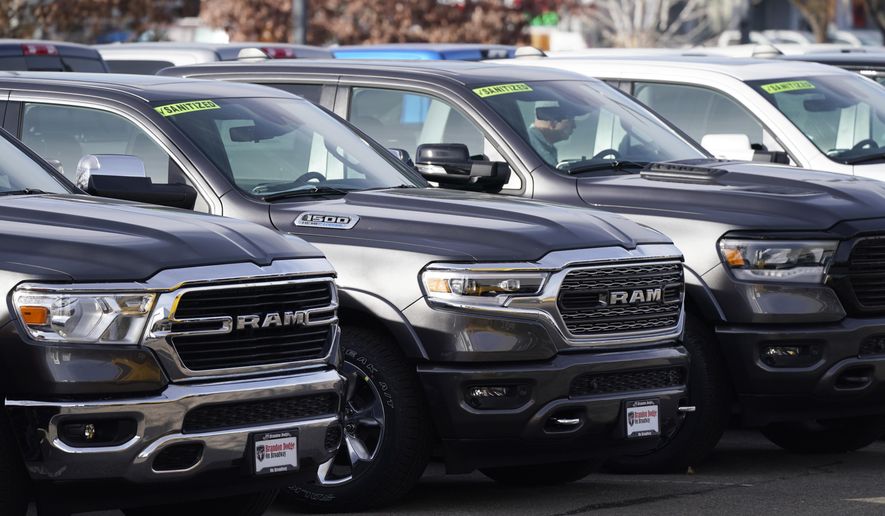OPINION:
Who should decide which cars you buy? Is it right for some consumers to subsidize the purchases of others?
For Team Biden, the answers are clear. They should decide what kind of cars you can buy, and yes, it is not only right but necessary that those who buy crossovers, SUVs and pickup trucks (which Team Biden doesn’t like) should pay more so that those who buy electric vehicles can pay less.
In the midst of the Christmas season, the Biden administration published a final rule that regulates greenhouse gas emissions from tailpipes. That regulation expands Environmental Protection Agency authority beyond its statutory limits, creates a federal mandate for electric vehicles, limits consumer choice with respect to cars and trucks, makes cars more expensive, and, perhaps most importantly, requires some consumers to pay for the choices of others.
Federal law does, in fact, give the EPA the authority to regulate emissions from cars and trucks. But the final rule goes well beyond that and expands federal government control over what kinds of cars can be sold. The regulation, which addresses model years 2023 through 2026, establishes a de facto federal mandate on automakers to sell a certain percentage of electric vehicles each year.
EPA acknowledges as much in the preamble to the rule: “The analysis for this final rule projects that EVs … will … increase to about 17% market share by [model year] 2026 …”
The rule also will increase the average cost for new cars by somewhere between $1,000 and $2,200. Trucks, SUVs and performance vehicles will cost much more (assuming they continue to be sold). All of that will price some people out of the new car market entirely. Team Biden imagines that reduced fuel use will offset the extra upfront cost. But that is purely speculative.
What’s not speculative is that the regulation requires automakers to produce a fleet that meets a certain average fuel efficiency. The way that works in practice is that those who buy larger cars — like trucks and SUVs — subsidize those who buy smaller, less popular cars.
Unfortunately, those subsidies are not transparent, so no one outside of those selling the cars knows what the cross-subsidy might be. But the math is pretty simple. If you are buying a crossover or larger vehicle, you are subsidizing someone else buying a smaller car or an EV. Next time you buy a car, you should ask the dealer on which side of the equation you are.
In the case of electric vehicles, however, there is an extra, obvious subsidy that routes $7,500 directly from taxpayers to purchasers of EVs.
The automakers know all about these subsidies, both murky and obvious. They are part of the racket, and they are, more or less (but lately more, a lot more) in league with the government.
Before meeting with President Biden recently, Ford CEO Jim Farley had this choice quote: “We’re going to do the investment [in electric vehicles] in the product and capacity expansion and make vehicles as affordable as possible. We need the government’s help to make the switch to e-mobility through consumer incentives.”
Back in 2018, a GM spokesmodel emailed The Associated Press: “We believe an important part of reaching a zero-emissions future … is to continue to provide a federal tax credit to help make electric vehicles more affordable for all customers.”
Get all that? If you want us to sell these losers, you need to give taxpayer money to induce people to buy them.
The EPA is making a similar admission through this rule. Electric vehicles just can’t seem to compete on their own without tax credits or mandates embedded in regulation.
This leads us back to the questions: Who decides? Who should make decisions about what kind of car you can buy? How much of your taxes are going to go to politically favored products?
As it stands right now, Team Biden’s bureaucracy is going to make all of those decisions for you. It knows how people will feel about that, which is why it buried the announcement of this regulation deep in the middle of the Christmas season. The last thing it wants is for voters to focus on what is, essentially, the theft of their right to decide.
Finally, what does it say about a product when the government has to mandate its sale and subsidize its purchase? How many pork chops do we have to tie around the neck of electric vehicles before the dogs are willing to play with them?
• Michael McKenna, a columnist for The Washington Times, is a co-host of “The Unregulated” podcast. He was most recently a deputy assistant to the president and deputy director of the Office of Legislative Affairs at the White House.




Please read our comment policy before commenting.